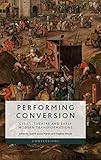Performing Conversion : Cities, Theatre and Early Modern Transformations / José R. Jouve Martin, Stephen Wittek.
Material type: TextSeries: Conversions : CONVPublisher: Edinburgh : Edinburgh University Press, [2022]Copyright date: ©2021Description: 1 online resource (216 p.) : 10 B/W illustrationsContent type:
TextSeries: Conversions : CONVPublisher: Edinburgh : Edinburgh University Press, [2022]Copyright date: ©2021Description: 1 online resource (216 p.) : 10 B/W illustrationsContent type: - 9781474482721
- 9781474482745
- online - DeGruyter
| Item type | Current library | Call number | URL | Status | Notes | Barcode | |
|---|---|---|---|---|---|---|---|
 eBook
eBook
|
Biblioteca "Angelicum" Pont. Univ. S.Tommaso d'Aquino Nuvola online | online - DeGruyter (Browse shelf(Opens below)) | Online access | Not for loan (Accesso limitato) | Accesso per gli utenti autorizzati / Access for authorized users | (dgr)9781474482745 |
Frontmatter -- CONTENTS -- Acknowledgements -- Series Editors’ Preface -- Contributors -- Introduction: Conversion, Cities and Theatre in the Early Modern World -- 1 Venice: The Converted City -- 2 Turnings: Motion and Emotion in the Labyrinths of Early Modern Amsterdam -- 3 Francisco Cervantes de Salazar’s Mexico City in 1554: A Dramaturgy of Conversion -- 4 Conversional Thinking and the London Stage -- 5 Religious Drama and the Polemics of Conversion in Madrid -- 6 Theatre and Conversion in Early Modern Zürich, Berne and Lucerne -- 7 Conversional Economies: Thomas Middleton’s Chaste Maid in Cheapside -- Coda: Performing Conversion in an Early Modern Future -- Index
restricted access online access with authorization star
http://purl.org/coar/access_right/c_16ec
Brings together diverse scholarship on theatre and conversional practices in early modern Europe and Latin AmericaMakes a compelling argument for the importance of theatrical practices and theatrical thinking in how conversion itself changed for early modernsDiscusses a wide range of theatrical practices that include, but are not limited to, established canonical authorsProvides new readings of classic plays by Middleton, Lope de Vega, and othersProvides a series of case studies of theatre and conversional practice centered around specific citiesThis volume asks, how did theatrical practice shape the multiplying forms of conversion that emerged in early modern Europe? Each chapter focuses on a specific city or selection of cities, beginning with Venice, then moving to London, Mexico City, Tlaxcalla, Seville, Madrid, Amsterdam, Zürich, Berne, and Lucerne (among others). Collectively, these studies establish a picture of early modernity as an age teeming with both excitement and anxiety over conversional activity. In addition to considering the commercial theater that produced professional dramatists such as Lope de Vega and Thomas Middleton, the volume surveys a wide variety of kinds of theatre that brought theatricality into formative relationship with conversional practice. Examples range from civic pageantry in Piazza San Marco, to mechanical statues in Amsterdam’s pleasure labyrinths, to the dramatic dialogues performed by students of rhetoric in colonial Mexico. As a whole, the volume addresses issues of conversion as it pertains to early modern theatre, literature, theology, philosophy, economics, urban culture, globalism, colonialism, trade, and cross-cultural exchange.
Mode of access: Internet via World Wide Web.
In English.
Description based on online resource; title from PDF title page (publisher's Web site, viewed 01. Dez 2022)


